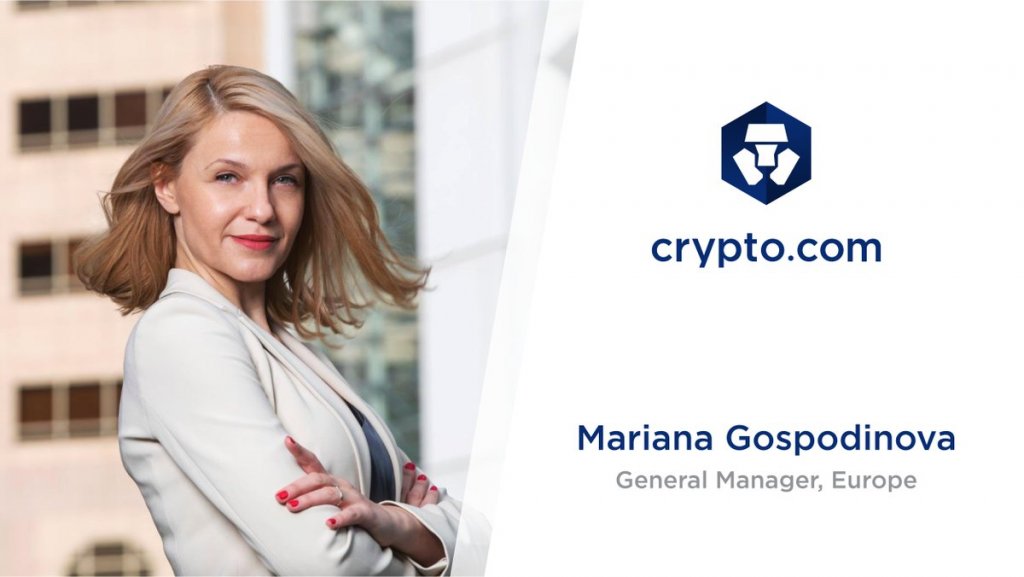![Europe has taken a clear stance on crypto and businesses should be prepared [INTERVIEW]](https://cryptoslate.com/wp-content/themes/cryptoslate-2020/imgresize/timthumb.php?src=https://cryptoslate.com/wp-content/uploads/2020/05/europe.jpg&w=70&h=37&q=75) Europe has taken a clear stance on crypto and businesses should be prepared [INTERVIEW]
Europe has taken a clear stance on crypto and businesses should be prepared [INTERVIEW] Europe has taken a clear stance on crypto and businesses should be prepared [INTERVIEW]
![Europe has taken a clear stance on crypto and businesses should be prepared [INTERVIEW]](https://cryptoslate.com/wp-content/uploads/2020/05/europe-768x403.jpg)
Photo by Jacek Dylag on Unsplash
Days before the wave of international lockdowns began, CryptoSlate had the opportunity to meet face-to-face with Crypto.com’s General Manager for Europe, Mariana Gospodinova. We discussed the company’s upcoming plans, trends for the rest of the year, and why stricter regulation in Europe is forcing companies’ hands.

Crypto.com is one of few companies in the space that allows its users to pay for goods and services using their crypto through a very simple vehicle — a VISA credit card. Gospodinova says:
“Our focus is on the retail customer and providing a service that they know and that they’re very familiar with. You don’t have to teach people to use a VISA card, and you don’t have to teach them to use an application in most cases either. The idea is that it’s no different using your crypto, you can use it as your fiat.”
She goes on to say that users also don’t need a deep understanding of cryptocurrency and the space since there is no need to learn about private keys, cryptography, or anything that seems very “distant and digital” to people.
“We try to make it more human and bring more people into the crypto market because we are trying to put cryptocurrency in every wallet and to do that you have to start with something people know.”
Gospodinova explains that even though users’ funds are in a centralized hot wallet at the moment they transact, Crypto.com keeps 100 percent of funds in cold storage. The company pre-funds everything that goes out of a hot wallet so:
“They’re not risking having their funds stolen because they’re in hot storage; its institutional-grade storage… A lot of people are scared to take their funds out of cold storage but all Crypto.com’s funds are 100 percent cold storage, we’re also the first company to be level III CCSS certified, and ISO 27001 across all platforms.”
Beyond crypto-backed VISA cards available in the U.S., U.K., and Singapore, the company also offers a suite of other financial products, including interest-bearing accounts and a lending facility.
But are people actually willing to spend their crypto?
Spending crypto through a card that easily converts it into fiat sounds delightfully simple. Yet, how many people are actually willing to spend their crypto? Right before the market slump as of March 2020, CoinMetrics found that around 42 percent of BTC had not moved on-chain in more than two years.
Gospodinova concedes that not every customer is looking to spend their crypto. However, not every customer is alike.
Typical “hodlers,” for example, are “definitely not selling, especially right now,” she says, “but they might take a loan. On the other end, we have people who are newcomers and have maybe received a digital asset and they don’t know what to do with it, or they just want to spend it because they need the money. We also have people who earn in stablecoins and they use it just to spend.”
Rather than getting dollars, pounds, or euros in their bank account with an almost negative yield, this enables them to get the maximum profits out of their earnings. They can earn up to 18% interest on their stablecoins or simply enjoy higher liquidity from a near-instant transaction rather than waiting days for a bank transfer to go through.
Let’s talk about the broader market and some trends for the crypto space
Derivatives are gaining a lot of ground in the crypto space. What is Crypto.com’s stance on this and do they have any plans to enter the increasingly competitive space? Gospodinova agrees that crypto derivatives are set to take off in a big way over the next few years. However, so is regulation and the two may not necessarily be compatible.
She says that Crypto.com is building an exchange for institutional customers. “Obviously, if you are going to service institutions apart from quick APIs and deep liquidity you have to offer derivatives and more financial instruments to make it more interesting and we are looking at that space further down the road.”
“The investment market is becoming extremely competitive and more and more interesting. It’s definitely going to grow and it’s all about, particularly here in Europe, how well you understand the regulations that you have to comply with and how quick you are to get your licenses in order. This is a highly regulated market and usually only available through certified investors.”
She says that while exchanges are still working as an intermediary, this has caused a lot of losses for many inexperienced traders.
“All of a sudden, they get access to margin trading and the losses they can generate are quite big.”
Europe is becoming heavily regulated
“At the moment, Europe is heavily regulated when it comes to any kind of investment services under the second directive,” she explains, “most likely, crypto exchanges will have to comply and we’ll have to get investment services licenses to be able to offer any kind of margin trading to users… This is not the case yet but I am expecting that this is the way Europe is going to go especially as ESMA (the European Securities and Market Authority) has recently announced that they are going to launch a pan-European legislation for crypto investments.”
This is based on the BAFIN legislation about cryptocurrency which has identified all cryptocurrencies as financial instruments. “It’s not exactly securities,” she says, “but it’s 99 percent securities.” This means that anyone trading cryptocurrencies will need a license. “So, this something that all companies will have to consider, depending on where they offer their services.”
Apart from increased regulation in the space, Gospodinova expects to see a rise in the number of STOs, now that companies have a better understanding of the requirements. STOs were the false-starter of 2019 but she believes that is because people were “too early and too quick” to assume that something so heavily regulated would get to market quickly.
She’s still bullish on the future of the space as a clearer regulatory framework will be helpful for many companies. However, she notes that this will shake out some players in the market. Gospodinova added:
“Europe is having a stance on where crypto will go, even if it will put some obstacles like getting licenses, at least you know where you’re headed to and it makes it easier.”






















































